#evaluators
Explore tagged Tumblr posts
Text

Vandy 1 taxiing at NAS Fallon - June 1985
108 notes
·
View notes
Text
guy who says "this is the worst day of my life" and then pulls out a spreadsheet ranking every day of their life so far to prove it
#🐉#got called 'chilchuck-core' in the group chat for this one so im submitting it to the council for evaluation
20K notes
·
View notes
Text
Ethical Juxtaposition:
Moralists & Evaluators
Moralist:
Definition:A moralist is an individual who evaluates situations and individuals primarily through the prism of moral principles and ethical standards. They base their judgments on established ethical codes, moral doctrines, or personal ethical frameworks.
Characteristics:
1.Ethical Foundation: Moralists typically rely on moral absolutes, virtues, or duties to determine the ethicality of actions.
2.Emphasis on Rightness and Wrongness: They focus on discerning whether an action aligns with moral principles, often emphasizing the moral correctness or incorrectness of decisions.
3.Value-driven Perspective: Their assessments often revolve around the adherence to ethical values, sometimes overlooking the contextual nuances of a situation.
Example: A moralist might vehemently oppose a decision purely on the grounds that it violates a particular moral principle, even if that decision could have beneficial consequences or a justifiable context.
Effectiveness of Moralists:
Moralists can provide a clear ethical standpoint, which can be beneficial in establishing principled guidelines and maintaining moral integrity. Their strong adherence to moral principles can serve as a guide for consistent decision-making, promoting ethical behavior. However, their rigid adherence to principles might sometimes overlook the complexities of certain situations, potentially leading to a lack of adaptability or understanding of diverse perspectives.
Downfalls of Moralists:
1.Rigidity and Inflexibility: Moralists may adhere strictly to ethical principles, leading to inflexibility in decision-making. This rigidity might not account for situational context or nuanced circumstances, resulting in impractical or overly stringent judgments.
2.Overlooking Contextual Nuances: Moralists might prioritize moral absolutes to such an extent that they overlook the complexities of real-world situations. This can lead to an inability to comprehend or address the multifaceted nature of certain ethical dilemmas.
3.Potential for Ethical Dogmatism: A strict adherence to personal or societal ethical codes might result in moral superiority or a sense of moral absolutism, leading to an unwillingness to consider alternative ethical perspectives.
Evaluator:
Definition: An evaluator is an individual who judges circumstances by considering a broad spectrum of factors, including context, consequences, and practicality. They analyze situations with a focus on understanding the complexities surrounding them.
Characteristics:
1.Contextual Analysis: Evaluators prioritize understanding the context, taking into account various external variables that influence a situation.
2.Practical Considerations: Their assessments often factor in the practical implications and consequences of decisions, beyond just ethical concerns.
3.Comprehensive Approach: They weigh multiple aspects, considering stakeholders’ interests, feasibility, and broader impacts.
Example:An evaluator would assess a decision not only based on its moral implications but also by considering its effects on different parties involved, its feasibility in a given scenario, and its overall impact beyond mere ethical considerations.
In summary, the moralist’s judgments are primarily grounded in moral absolutes and ethical values, while the evaluator’s assessments consider a broader array of factors, including context, consequences, and practicality, to comprehend the complexity of a situation.
Effectiveness of Evaluators:
Evaluators, with their holistic approach, often consider a wide range of variables and consequences. This can result in more flexible and adaptable decision-making, taking into account the practical implications and various contextual factors. However, a solely evaluative approach might sometimes overlook or undervalue moral or ethical principles, potentially leading to decisions that lack a strong moral foundation.
Downfalls of the Evaluator:
1.Ethical Compromise: Evaluators, in their pursuit of considering multiple factors, might sometimes overlook or undervalue ethical principles. This could result in decisions that lack a strong moral foundation, potentially leading to ethical compromises.
2.Decision Paralysis: Considering numerous variables might overwhelm evaluators, causing decision-making to become excessively complex or delayed, leading to missed opportunities or indecision.
3.Ignoring Moral Imperatives: In some cases, the comprehensive analysis by evaluators might result in a tendency to prioritize practicality to the detriment of ethical considerations, potentially disregarding fundamental moral imperatives in decision-making.
Dual Perspective Analysis:
In the midst of the American Civil Rights Movement, two prominent figures, Martin Luther King Jr. and Malcolm X, embodied contrasting approaches to achieving racial equality.
Martin Luther King Jr., akin to a moralist, championed nonviolent resistance and civil disobedience. He adhered to a moral and ethical stance, rooted in principles of love, justice, and equality. His advocacy centered on the application of Christian principles and moral absolutism to bring about societal change. King emphasized the importance of nonviolent protest as a means to attain civil rights, believing in the inherent morality of the cause and the necessity of moral persuasion to effect lasting change.
Malcolm X, on the other hand, exhibited the traits of an evaluator. Initially advocating a more aggressive stance, he later shifted his perspective. He highlighted the complexities of racial inequality within the context of societal and systemic oppression. Malcolm X emphasized self-defense and stood for confronting the systemic injustices faced by African Americans, recognizing the harsh realities of racism and advocating for assertive actions to counteract it.
Their differing approaches highlighted the ethical juxtaposition within the Civil Rights Movement. While King stood firm on moral principles and nonviolent resistance, Malcolm X navigated the landscape of racial injustice, acknowledging the context of oppression and advocating for more forceful measures to combat it.
Their contrasting ideologies demonstrated the ethical duality inherent in approaching societal change—between the unwavering adherence to moral principles and the acknowledgment of the harsh realities that sometimes necessitate a more assertive and confrontational approach to effect change. Both figures left an indelible mark on the Civil Rights Movement, showcasing the importance of multiple ethical perspectives in achieving a common goal of equality and justice.
Exploratory Questions for Discussion & Deliberation:
1.What defines the boundary between unwavering moral principles and pragmatic considerations in decision-making?
2.How do individuals navigate the tension between ethical absolutes and contextual complexities when facing moral dilemmas?
3.Can one effectively balance ethical principles and situational analyses to make decisions that consider both moral integrity and practical implications?
4.What role do personal values and societal norms play in influencing moral judgments and evaluative assessments?
5.How do different perspectives on morality and evaluation shape our understanding of ethical dilemmas in various historical contexts?
6.Can a principled approach to decision-making accommodate the complexities of real-world situations, or does it inherently lack adaptability?
7.In what ways do moral absolutism and contextual evaluation complement or contradict each other in the pursuit of ethical decision-making?
8.Are there instances where a strict adherence to ethical principles might lead to unintended consequences or overlook contextual nuances?
9.How can we foster a balanced approach that incorporates both moral principles and contextual analyses in ethical decision-making processes?
10.Can historical examples of contrasting ethical approaches offer valuable insights into resolving contemporary moral dilemmas?
0 notes
Text

Artist has a brief moment of self-awareness while drawing
1K notes
·
View notes
Text
"I've been waiting for ages for somebody to unmask them."

This moment tends to elicit negative reactions in a first read through, and I've got some opinions about why where Kabru is coming from here actually makes a lot of logical sense. So I thought I'd elaborate on that.
I think people hear this and go, "He thinks they must be hiding something because they gave money to someone? What a cynic." Or "he dislikes them because they did charity?? What's wrong with this guy!". And obviously, a lot, a lot is wrong with him. But I think this makes more sense than it seems at first glance! What people evaluating this judgement miss is why Kabru is paying attention to Laios and co to begin with.
Kabru knows of the Touden siblings because (he's a little bit of a stalker-) he is keeping an eye on all the relevant parties in events developing on the island, in order to be able to guide them to his preferred outcome. This includes adventurers because they are the ones actually exploring the dungeon! He's well aware that something as minor as internal tensions between party members could be key to the historical events that are developing. (He would love the assassination of Archduke Franz Ferdinand.)
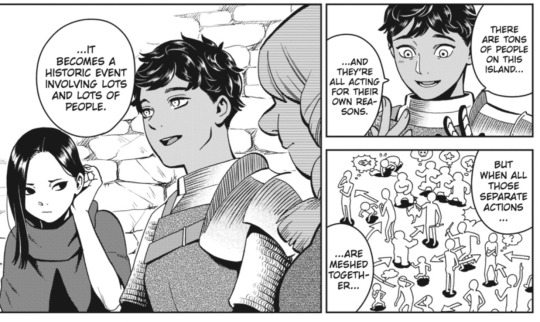
His desired outcome is that whatever the rewards are of breaking the dungeon's curse, whether that's kingship or the ancient elven secrets of dungeons, are claimed by:
A) a short lived person
B) Someone who will be a good, effective leader and/or use those secrets and the power they carry wisely, with foresight, and to establish a political bloc for short lived people.
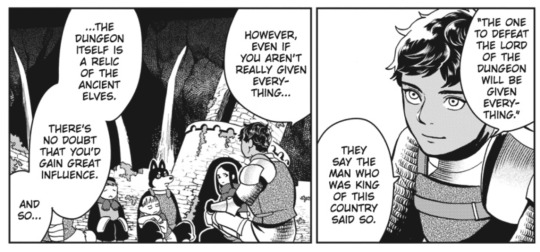
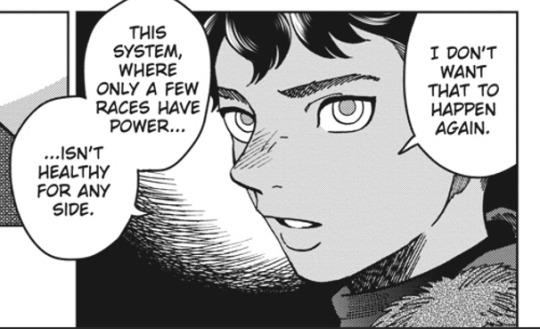
The person he can best trust to do this is, of course, himself. But due to his PTSD regarding dungeons and monsters, he's not able to develop the necessary skills to conquer the dungeon. Once he realises this, he starts looking for someone else who he can support to that end.
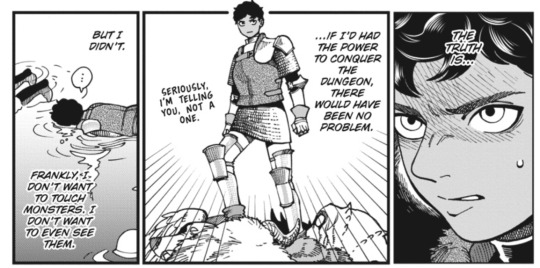
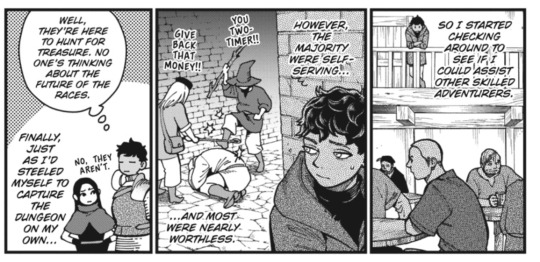
But most of the adventurers don't have any intentions of conquering the dungeon, don't have the skills, or are unsuitable in other ways. In fact, it seems like some potentially suitable people are the Toudens. There are a lot of good rumours about them going around - they actually seem to have a very positive reputation! That's what Kabru means when he says "unmask".

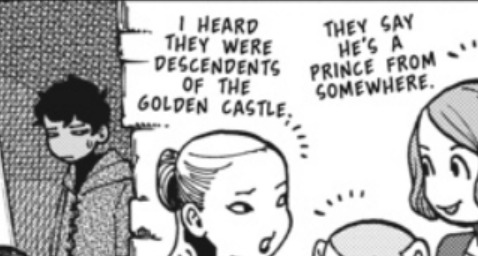

So when Kabru is observing something like them giving money to an old comrade from their gold-peeling days, he doesn't consider it a problem because "they're giving money to this person who doesn't actually need it" or because they must have some dark secret if they act superficially nice. I think he actually understands this situation and what it implies about Laios (in particular) perfectly well.
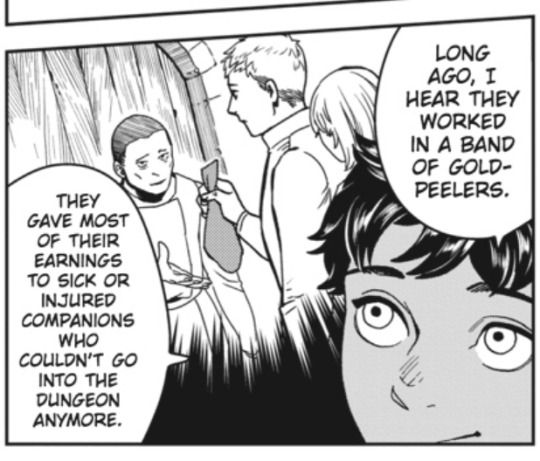
Laios and Falin gave money to an old comrade who got injured and couldn't work. That person then healed up but kept taking their money. Then he used the money to start smuggling illicit goods to the island.
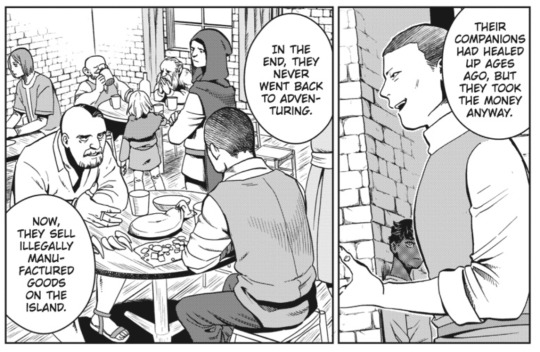
The key is that for Kabru, the problem here is the same as with the corpse retrievers - people using the dungeon's resources to fuel dangerous, selfish, or violent pursuits cause problems for the island, attract more criminals and people with motives other than breaking the curse, and increase the chances of the whole situation ending in tragedy.

Kabru is willing to work with the Shadow Lord of the island if it gets him to his goal - he isn't scrupulous - but the criminal element of the island increasing is something he sees as a major issue.
Also, when you're evaluating someone as a candidate for power, riches, secrets, potentially kingship - then being curious about how the money you give to people is going to be used is kind of a relevant trait!
Interpersonally, Kabru's actually very easygoing - I mean, Mickbell isn't exactly an upstanding guy, is he! But Kabru likes him and they get along well. These traits wouldn't be a problem at all in a friend, or a comrade, or someone Kabru was confident he could use. But he can't get a handle on Laios, and Laios is someone who has the potential to be a major player!
On Laios' end, this is the same as with the marriage seeker who joined their party. She kept asking for things and he gave them to her, because he tries to be nice to others. He even gives her money! It's the exact same thing.
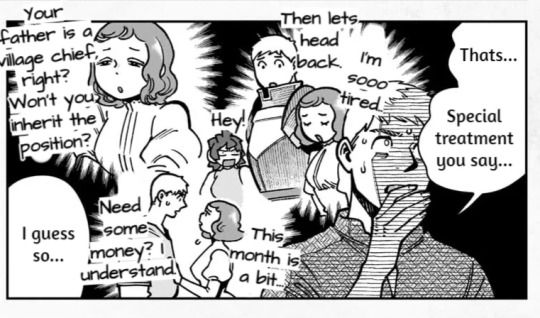
That's fine, but it became a problem because he basically wasn't interested in her motives, didn't notice she was trying to manipulate him, and it also didn't occur to him that the other party members would notice or be affected. We can assume the situation with the gold peeler is the same. When Kabru says that "It's not that they're bad people, they just aren't interested in humans," he isn't wrong.
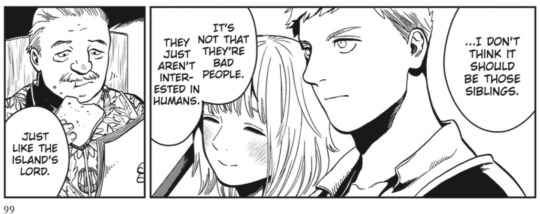
The extent to which this is true of Laios is linked to his autism imo, (because it isn't just disinterest - he genuinely isn't able to notice nonverbal cues that people are lying to him or have ulterior motives) but to a greater or lesser extent I think it's a very common trait. Most people aren't actually that interested in other people who aren't close to them. Kabru is the weird one here. It isn't an issue except as a leader - which is why we see an immediate comparison to the Island's Lord, because that's how Kabru is evaluating them.
And disinterest in/lack of ability with people to the extent Laios exhibits it, it does, actually, make him a worse leader... it's just that as we see in the story, people can help him out. The rest of the party tell him the marriage seeker is taking advantage of him so he tells her he can't give her special treatment anymore. They're pissed and it's a crisis point - he couldn't have recovered their trust without Marcille and Falin - but that's exactly the point. With Marcille and Falin, he was able to recover their trust.
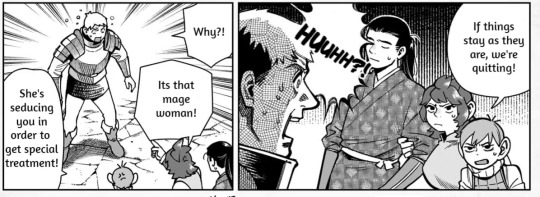
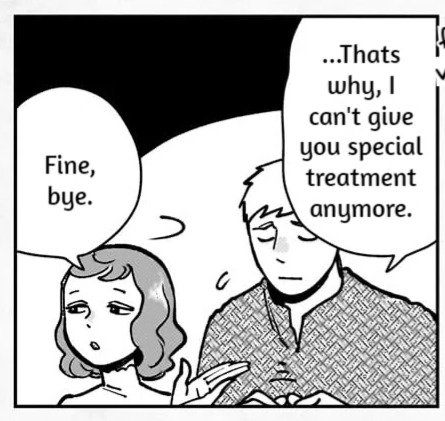
And he has other good traits that make up for it, such as his intelligence, strategic knowledge, open-mindedness and sense of fairplay.
Kabru doesn't disqualify Laios as a candidate based on what he sees about him from afar, though - he still tries very hard to get close to him, obviously hoping that if he manages he can steer Laios to defeat the dungeon and make up for his lack of people-skills in the aftermath. (Which... he does eventually achieve that goal!) He completely fails until the events of the story, so... definitely I think "They just aren't interested in humans" could also partially be a stung reaction to Laios' complete disinterest in him.
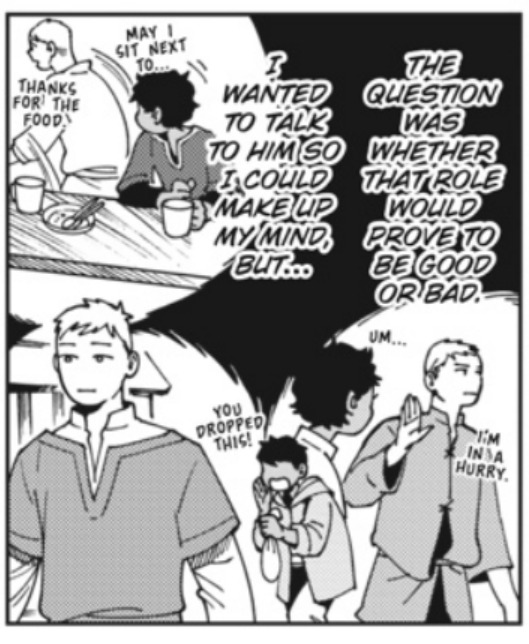
Anyway, that's my read on what exactly Kabru's "issue" with Laios is. Obviously, once he does find out what Laios' true nature is like - about his love for monsters - he develops an entirely new set of fears about Laios' priorities. But since Laios kept that a secret until the start of the story, he has no idea of that yet.
Given all that, I think it's interesting that he says that he doesn't think that the Toudens are suitable to defeat the dungeon, and that he's hoping they'll turn out to be the thieves. As some of his few potential candidates, people who he thinks may play a big role in the island's future, you'd think he'd hope they would be good people!
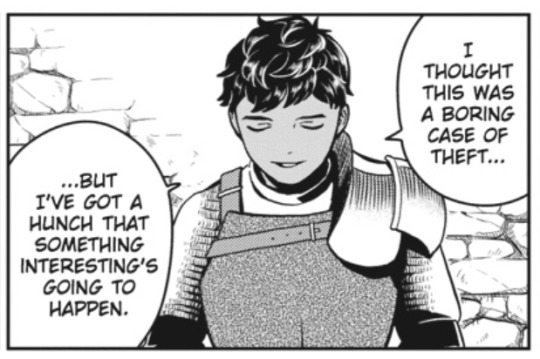
I suppose it's better, in his eyes, because it means that he's involved in something "interesting". They haven't just had their stuff stolen by regular criminals (boring, puts them further away from his goal) - they've been caught up in the beginning stages of "a historic event". The desperate and dwindling group forgetting morals in their quest to retrieve their lost comrade probably appeals to his sense of melodrama. Because he also just... loves drama.
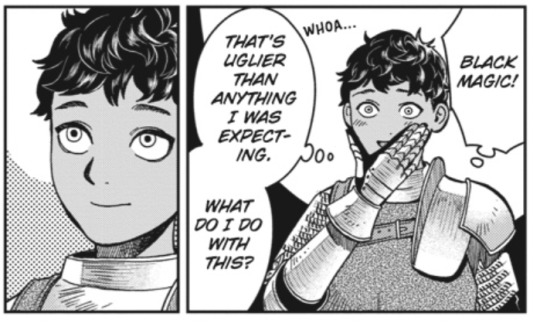
Despite it being "uglier than anything he was expecting", he still pursues Laios as the person he wants to conquer the dungeon pretty much as soon as it becomes clear that he won't be able to do it himself and they are out of time. That's because... well, to be fair, there aren't any other options. And he fits standard A: he's short-lived!
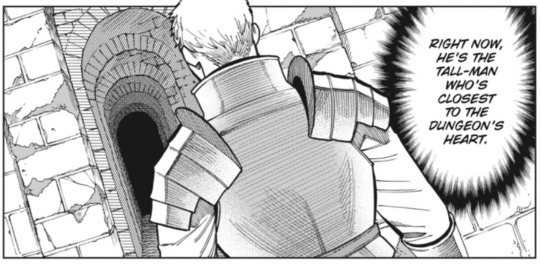
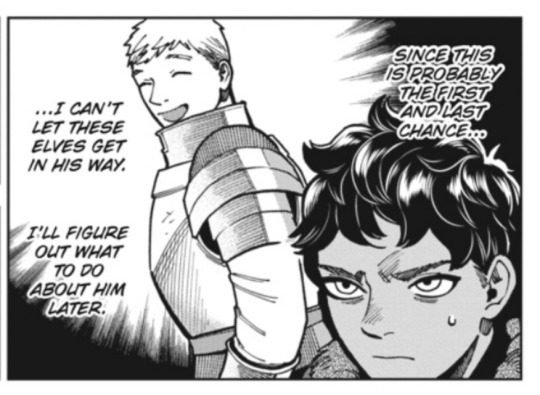
and Kabru still hopes he can fit standard B, too, and be persuaded to use the power he wins for good. No matter how many nightmares he has about Laios, or whether he thinks about killing him. He doubts him, but ultimately he puts his faith in him and seems happy after the manga's ending that he made the right decision.

#dungeon meshi#dungeon meshi manga spoilers#dungeon meshi meta#kabru of utaya#laios touden#labru#laios x kabru#dunmeshi#og post#kabru is such a big picture thinker. and he evaluates people more than he judges them imo#the hater jokes are funny but the people he judges most harshly arent laios and co. they're people like the island's lord.#but you don't see that as clearly because he isn't interested in the island's lord. he understands him. finds him contemptible but useful.#whereas laios lives in his brain rent free because he WANTS to understand him but doesnt quite.#even though he sees the elves as a major threat to his ultimate goals and dislikes the way they treat short lived races#he still understands and evaluates mithrun as an individual based on his own merits#he's one of the characters who is least judgemental in that sense because while he's always making judgements and evaluations#he's also constantly revising them whenever he gets more information#my beautiful machiavellian prince <3#it's genuinely a really laudable way of understanding others imo.#the only problem is that because he's driven towards his goals by his PTSD and survivors guilt#he pushes himself into situations (the dungeon and also interpersonally) that trigger him or even just upset him#without regard for what he authentically wants or his own wellbeing.
4K notes
·
View notes
Text
Richard Nixon paved the way for Jimmy Carter who paved the way for Ronald Reagan who paved the way for Bush 1 who paved the way for Bill Clinton who paved the way for Bush 2 who paved the way for Barack Obama who paved the way for Donald Trump who paved the way for Joe Biden who successfully paved the way for driving a fatal nail in the coffin of what is blithely referred to as "liberal democracy" in America. i hold all of these ghouls and every one who came before them responsible for what has happened so far and what will happen next. the global south has long held the relationship between the US head of state and the B-52 or the MQ-9 Reaper dropping thousands of pounds of explosives on their native homelands as superficial and they've always been right. an empire is going to do empire shit no matter who the emperor is.
#text#indigenous and Black people have known the heart of this country since the beginning#that's why i tend to listen close when they speak#and so far they've been mostly correct in their evaluation#primarily because they've lived it and rightfully accept what time has taught them
695 notes
·
View notes
Note
im going around tumblr saying what I think people's artstyle tastes like
yours tastes like when you eat a bag of Skittles all at once i love it
-👾

in all seriousness, though, i’m positively fascinated by that description, thank you very much
#hatsune miku#vocaloid#piapro studio#doodle#ask#anonymous#putting it in the tags so it doesn’t seem like i’m asking people to do it#but i’m honestly pretty bad at effectively evaluating my own work (comes with the job lol)#so i like hearing what people have to say about it
3K notes
·
View notes
Text
Goose said on Twitter that Episode 5 is the second most self-indulgent episode in the series. Episode 8 is the most self-indulgent.
Episode 5 has the most whack Bubble lines so far, maid Jax, feral Jax, an anime sequence, a bar scene, Jax angst, Ragatha angst, Caine angst, evil versions of the main characters, the Moon being thirsty for Caine, Jax making a dirty joke, and the whole intermission sequence.
What the flying fuck happens in Episode 8 that makes it MORE self-indulgent than Episode 5???
#tadc#the amazing digital circus#tadc episode 5#tadc spoilers#by the way she said Episode 4 is the third most self-indulgent#considering the employee re-evaluation scene that makes sense
870 notes
·
View notes
Text
i never liked the idea that good trans rep has to be so subtle its easy to miss. nothing wrong with a character saying "im trans" or dealing with their experiences as a trans person.
just let them have a personality too, don't tokenize them. And make them a weird freak. we need more trans characters that are weird freaks.
#txt#idk it just makes me think abt how straight men will consume yuri but ONLY if its subtle enough where it can still#be denied that its romance. and then turn on it when characters explicitly talk about their relationships#like when they turned on a show after 3 seasons because a lesbian flat out said 'im not attracted to men. i only want women'#trans rep shouldnt be 'subtle enough that its easy to miss and i also dont have to evaluate my own prejudices'
2K notes
·
View notes
Text
GUESS WHAT FUCKNUTS
it's 11:30 am on a tuesday, and I've completed all the work I had for this week.
#now back to unjortsing my pants#I've got a psych evaluation tomorrow and it won't do to show up in pants that are all fucked up
409 notes
·
View notes
Text
I'm perpetually in awe at the number of people who are well in to their twenties and beyond who still think an on-screen portrayal of something, regardless of nuance or background context, automatically equates to inherent glorification or real-world endorsement of the actions being portrayed.
#nosferatu#nosferatu 2024#orlok#count orlok#robert eggers#this isn't me saying that criticism of these things is Never Allowed#i'm all for thoughtful and nuanced evaluations#but not when it's just boiled down to 'X character did disturbing thing on-screen and that's Problematic!'
550 notes
·
View notes
Text
There’s not enough people talking about how important Stephanie is to Damian’s growth pre-Flashpoint.
Bruce had seen Damian as a beast to be tamed, Tim sees him as a ticking time bomb, and Dick is far better with him but he’s still an authority figure for Damian to combat with. But then he meets Stephanie, a college-aged girl who nobody trusts and he bullies her relentlessly and becomes inseparable from her.
She doesn’t interact with him based on his past, but on what she can see. This 10 year old just threatened to kill her? Wow he doesn’t get outside much. He’s not old enough to have seen Gremlins. What do you MEAN you’ve never been inside a bouncy house before we are fixing that immediately.
They are like cousins to each other. They poke fun at each other for being lame and stupid and Dick has to tell them both to shut up. She doesn’t see him as a project to be molded and redeemed, he’s just a kid with a crappy childhood like her and if he’s nice to her for 5 seconds she’ll do something with him to let him feel like a kid. And he doesn’t look at her and see a liability or a failure or a lost cause, like everyone she’s ever interacted with does. When he’s awful to her, it’s because he’s an obnoxious preteen boy.
And then you get the “there’s room in our line of work for hope, too” scene. Because Damian has gotten to know Steph and he can’t fathom why she’s here. She obviously has had to deal with crap and is still working through being kept on a leash by Nightwing and Oracle, but she isn’t broken like the rest of them are. Damian is surrounded by people who were molded and shaped and torn down and broken to become the monoliths that they are, and then there’s this girl who seems so at peace with herself and is constantly making quips, and it’s so foreign to him.
And she tells him that she’s in his world because she believes people are worth fighting for.
#Batman#damian wayne#stephanie brown#robin dc#batgirl#batgirl (2009)#Batfam#Batfamily#dc comics#batman meta#batgirl (2009) is my favorite comic I’ve ever read can you tell#I just love how Stephanie and Damian are so removed from everything when they’re together that there isn’t any hierarchy between them#they each have some sort of hierarchy and Expectation around literally everyone else#but with each other they’re just peers#they can work together and fight together#they can hate each other and be bickering the entire time#but they evaluate each other based on what they see#Damian sees a goofy but determined woman who doesn’t look at him like he needs fixing#and Stephanie sees a violent kid who clearly hasn’t had a childhood but is trustworthy in a fight#and they just. interact based on those factors and nothing else#and it’s so beautiful for them both#and you have the whole ‘fatgirl’ and ‘when did you start stuffing your suit’ comments from Damian that suck#but weirdly I find it comforting because it implies to me that Damian is feeling some stuff that’ll tie into puberty#and he lets himself (albeit in a very uncomfortable and harmful way) feel those emotions and express them to Steph#like it’s very stupid and so early 2000s and frustrating#but I think it’s a little charming how it’s another example of Stephanie sort of being a vessel for Damian to experience normal feelings#even if he ends up being very Damian about it
734 notes
·
View notes
Text

I SWEAR TRYING TO GET GOOD IMAGES OF MR. RING-A-DING IS A RIOT BECAUSE EVERY TIME YOU END UP WITH INBETWEENS LIKE THIS 😭😭😭😭😭
#i'm howling why is this so funny. sir what is wrong with your FACE#this is the man folks. this is the one we've chosen to simp for. are you evaluating your life choices yet#mr. ring-a-ding#mr ring-a-ding#mr ring a ding#lux#lux imperator#doctor who#dw#starleskatalks
297 notes
·
View notes
Text
just one of those days man...
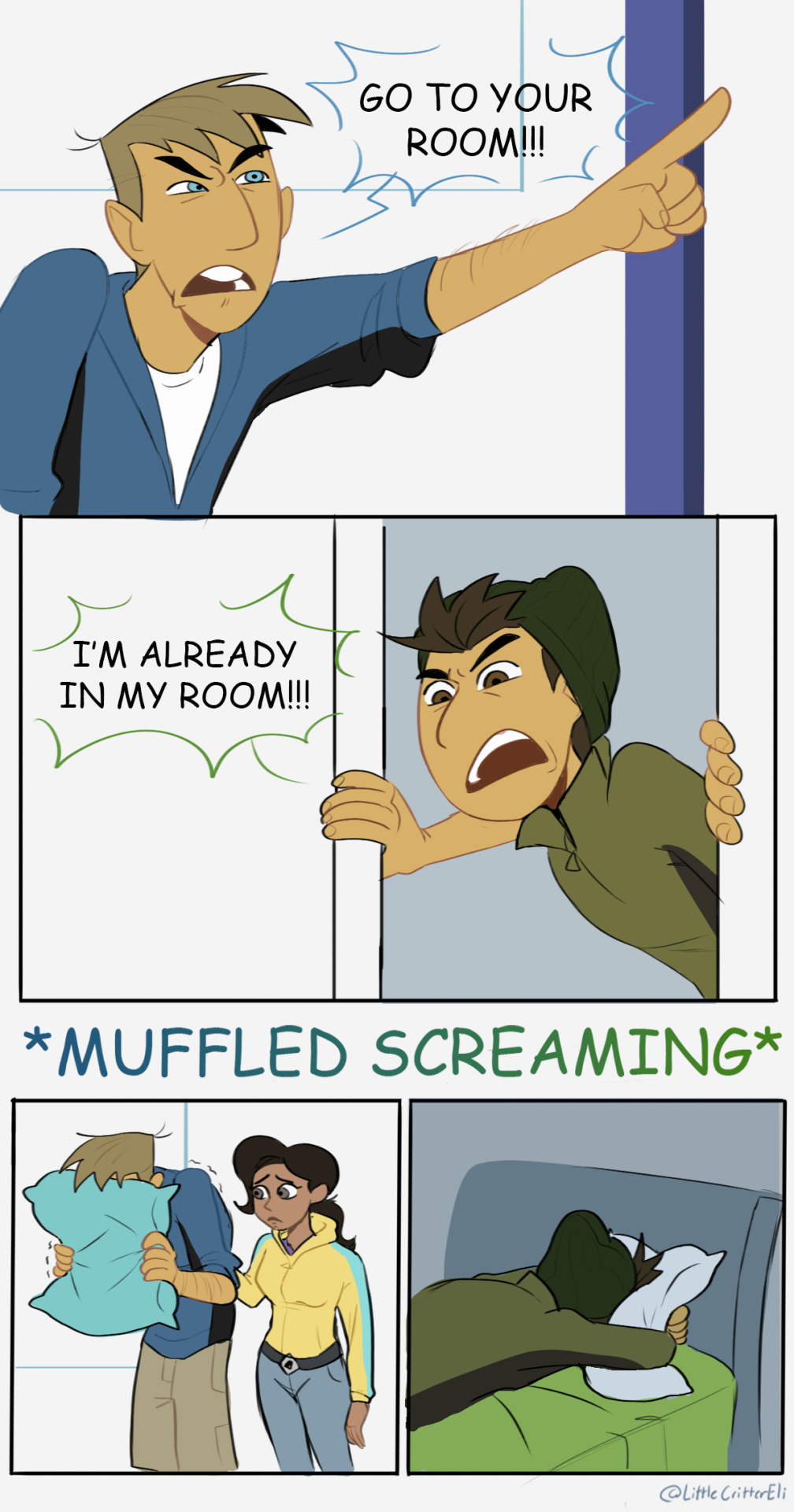
THIS IS SO LOW QUALITY HELP LOL
ignore that I can't draw very well rn I'm very focused on school so not much time to doodle
#wild kratts#littlecrittereli#WK Guardianship AU#wild kratts fanart#kratt brothers#wild kratts au#chris kratt#martin kratt#in reference to that once scene in lilo and stitch#Its so funny drawing Martin angry bc he is literally the most head empty guy ever#but no one knows how to push buttons like ur brother <3#context? uhhh no!#idk hes stressed about some evaluation with Chris' caseworker or something#and Chris is having one of his “I need to prove myself even if it means putting myself in danger” moments#and Martin is like dont DO that#POV ur little brother tries to go out and get you accused of child endangerment right before ur assessment with CPS
2K notes
·
View notes
Note
thanks for being one of the few mouthwashing artists who is like.. normal about jimmy, is the only way i can describe it. for treating his character just as seriously as all the other tulpar members, not being afraid to analyze/explore his character and relationships with the others; for not outright refusing to draw him etc. i feel like a lot of people think that including him in fanart/analysis is equal to excusing his actions and it really sucks to see that, so it's always refreshing to see someone give him as much thought and appreciation as any other well written character.
Thank you, but it makes me wonder how cooked this fandom is, if I'm getting praise for treating the central protagonist and main character of the story as just A Character In The Story. And he isn't even my favorite. I understand the aversion to Jimmy obviously, but a lot of people act so immature about him.
#can we evaluate characters by their narrative value and their role in the story#can we be nerds and analyze characters looking at their characterization and explore them in different scenarios#can we play with them like dolls#jimmy mouthwashing#mouthwashing#asks
567 notes
·
View notes